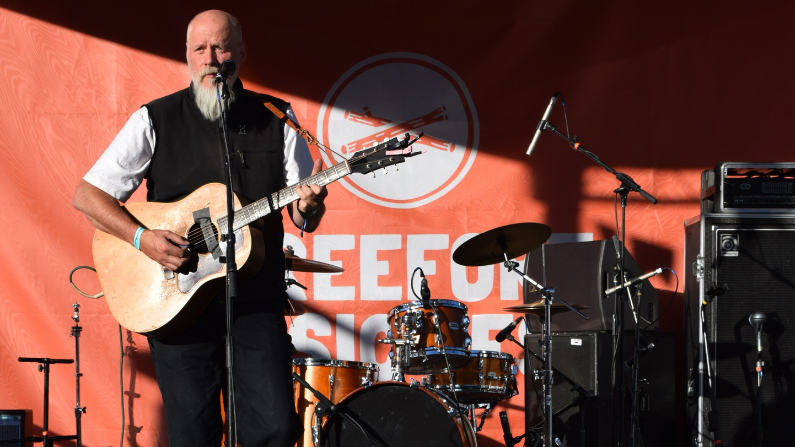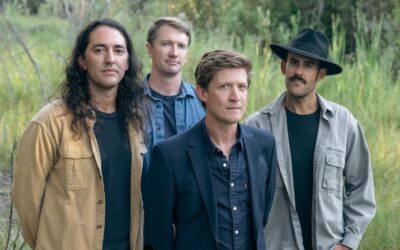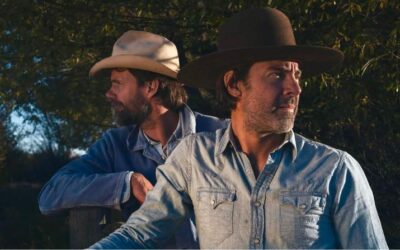Centennial, Wyoming, based musician J Shogren’s dark and humorous songwriting features roots music filtered through a dissonant lens. Shogren was one of six acts representing the Cowboy State during Wyoming Art Council’s Wyoming Showcase on The Hideout stage at the recent Treefort Music Festival in Boise.
Shogren joined KHOL Music Director Jack Catlin on the day after his set to discuss his “catawampus” style, the music scene in Wyoming and the connection between his love for music and economics.
Listen above for more and check out a transcript of the interview below.
KnewJack: This is KnewJack, the music director at KHOL in Jackson, Wyoming, coming to you live from the Treefort Music Festival in Boise, Idaho. I’m here with J Shogren, who performed yesterday here as part of the Wyoming showcase put on by the Wyoming Arts Council. For listeners who are new to your music, can you tell us more about your sound?
J Shogren: In one word, “catawampus”. It kind of sounds like an old truck going down a dirt road with things bouncing out the back. I’ve played music a long time. I’ve written lots of different songs and different styles because I’m interested in just a variety of ways to express yourself musically. And so it’s hard to pigeonhole the sound in one specific thing, but it’s kind of a blend of Americana, rock, country, folk. Throw in a little bit of influences like polka. I love punk. So it’s just a real agglomeration. I would say
KnewJack: “Catawampus” — love that I had to look that up before coming here today.
J Shogren: To me, it just kind of lets me off the hook too, because, you know, if you do something and it doesn’t pan out well, I mean, it’s just part of the enterprise of art to try new things and see if you can understand how other people created things. That’s also, you know, I’ve got one of those sort of brains that is very interested in how some people created the sound they created and and those people live with that sound their whole life. And so sometimes it’s interesting to explore that, too to get a better understanding of them.
KnewJack: So, it’s been a tumultuous couple of years, not just with the pandemic, but protests for racial justice, presidential elections, debates about vaccination, et cetera. What role for you has music played in processing the time that we’re living in?
J Shogren: For a lot of the isolation and just a lot of the incoming. I spent the last year and a half hunkered down in my studio or “The Stump”, I call it, down in my basement. I put out an album and that was mixed by Pat Sansone from Wilco, and he played a little bit on it. And then I also decided I’d learn more about sound engineering. So I took all the songs from my first four albums and got the rough files for them from the stems that was recorded in Laramie at Thunder Ground Sound Studio, and I started to remix them and releasing them and just to learn the whole process. And that’s been great, and I just rereleased two of my favorite sort of epic Western songs that start small and get big, kind of like a Sergio Leone movie. It was a great experience. It just was a chance to take a look at the technical side and process all the input coming from everywhere and trying to really channel all that energy into something creative rather than than just twiddling my thumbs for the last year and a half.
KnewJack: We’re a community radio station, KHOL, based in Jackson Hole. Do you have a favorite hometown community radio station?
J Shogren: Well, I listen a lot to the Wyoming Public Radio and we also have KOCA, which is our local radio station there, and they do a lot of funky stuff. You name it, they play it, and that’s a fun radio station as well. When I’m up in Jackson, I love listening to you guys because it is eclectic. It’s a wide range. A lot of music I’d never heard before lot. A lot of new sounds, a lot of new input that I get driving around town. I’ve really enjoyed what you guys have done up there too, and really appreciate the willingness to reach out and try new songs from new bands and old bands and trying new things, et cetera. It’s a great mix.
KnewJack: So, you are known for your captivating voice and dissonant tunings. Your songs are complex and contain a lot of depth. I feel like it’s a reflection of Wyoming’s itself in a way. What is your creative process when coming up with these unique stories you like to tell?
J Shogren: Yeah, Wyoming is… it’s one of them sort of calm waters with really a lot of depth to it. You know, people glide through Wyoming either on I-80 or they come up to Jackson. It seems everyone comes up to Jackson, of course, and a lot of times they don’t see just some of the hardscrabble things that are going on. I grew up in northern Minnesota, and it’s a lot like here, except a lot wetter, but the people are very much the same independent at the same time, helpful and cooperative. And so a lot of the songs I write are about those people, either in my family or people I’ve known, and I try to understand the choices they made in their life a little better by putting myself in their shoes and then adding some complexity to their life by trying to find the right music that would fit their story. It’s, you know, looking inward and trying to dig into my own soul is somewhat awkward for introvert. And so looking out at other people’s lives, especially your family and friends and other things, and everybody hits a fork in the road. I would say that I’m most interested in in those forks and how you chose left over right or how you got stopped. To me, that opens up a canvas and sometimes it might be a little intimidating to the listener to try to figure out where am I coming from? And so I try to give enough of a backstory so that I’m not just leaving you in the dust here with this story, but at the same time, I don’t spell it out ABCD. So part of it is is on the listener to try to weave together the different emotions that are happening. If I had to ex-post analyze it, that’s right. If I was laying on the psychiatrist couch, that’s probably how I would explain it.
KnewJack: Although your songs are deep and thought provoking like we just mentioned, I really liked what you said on stage last night. You said, ‘I’m playing moody, mellow music, but not feeling that way at all. I’m very excited to be playing live music again.’ Can you just touch on that and expand on how great it is to be back on stage and playing for an audience?
J Shogren: Yeah, I think every musician feeds off the energy the audience brings and a place like Treefort or all the festivals in Wyoming as well, where you’ve got an audience that is feeding back the love and you feel it and you feel that energy. And I and I do write moody songs and I and I understand that, but I’m never really moody on stage. I mean, it just is a fun place to be in that you really can see how your music or how your art can affect people and can make them smile or can make them dance, depending on what kind of band you are. When I first started off, I played in polka bands and then there was nothing like seeing blue haired ladies, whether they were 90 or whether they were nine dancing with their partners. And it’s always been a thrill of mine to do that. We used to play the butterfly dance. You know where you have three people and you go slow, and then all of a sudden you go fast. And we did that at so many different weddings. You never saw happier people at the end of the night.
KnewJack: Amazing. Nine to 90. Love that. So, you’re based in Centennial and Laramie and Wyoming. What is the music scene like there?
J Shogren: Laramie has got a real hopping music scene with the university and everything. There’s lots of good feedback. Lots of people coming and going. Lots of energy. Lots of people play in many different bands, you know You start a band and then you have a vision while there’s somebody else who’s going to help you pull that vision off centennial to for a small town of 100 people, 200 somewhere in the valley. At one point there were four bands in Centennial, you know, and they all range from great to excellent. You know, it was it was pretty fun. So Southeast Wyoming has a great musical culture, and I know Wyoming Public Radio and Grady Kirkpatrick and his crew there have been a big supporter of southeast Wyoming, but of Wyoming in general, and it’s also close to Fort Collins and the front range. And so you get spillover there. And I know a lot of people from Wyoming have moved down to Fort Collins or moved in that area just for a little more exposure. And so it goes back and forth. You know, it’s easy enough to find a band if you come to Laramie. I mean, you got a you got a poke around a little bit, but there are just so many different players.
KnewJack: What is your opinion and perspective on the music scene in Jackson?
J Shogren: I think Jackson’s the same. It seems like, again, there’s just a real hard core group of musicians that move around, whether they’re playing with the Chanman’s reggae band or they’re playing, you know, the J Bar singers or whatever. Again, it’s this pretty tight knit community I think in Jackson and spills over onto the other side in Victor and Driggs, and it seems to me that it’s a real, a real positive community and they come down and visit us. I run a little festival in Centennial every year, “The Centennial Uptown Break Down, and we’ve brought down several Jackson acts over the years and it’s been great and people have been very receptive. I know it’s got to be crazy to be a musician in Jackson, given housing prices and trying to make ends meet and all that. So thumbs up to all of all of them who are working their tail off to keep playing.
KnewJack: All right, we’re going to close up here with an amazing fact about you. You’re not only an accomplished musician, but also a University of Wyoming economics professor who just so happened to win a Nobel Prize as a former advisor to President Bill Clinton. How do these two worlds relate to each other?
J Shogren: Just to clarify, I was part of the team that won the Nobel Prize, so it’s like even if you’re on the bench and North Carolina or Wyoming in 1943 wins the basketball championship, you’re still part of that winning team. So I didn’t win it myself personally, but it’s being part of the team. To me, science and art go together. I mean, you need the science to sort of dissect a song and what’s going to work and to edit things and not just have it too free form. And with science, you need the art to be able to explore new ideas and find step outside the box and step outside the rigor that science demands so that you can have one of those “a-ha” moments. And I think that for me, being able to operate in both worlds helps both worlds. At least for me, it does makes my science more creative and it makes my art more “reined in”. Let’s put it that way, less self-indulgent. And so those two things I think, work together really well. It’s funny over the years or the three four decades I’ve been doing economics, I meet economists and some of them I get along with better than others, of course. And I find the ones that have been my long term friends are also closet musicians, whether they’re in Sweden or whether they’re in Scotland or whether they’re in France. I end up finding out they’re in a band, doing something, playing music somewhere, and I had no clue of that. And but we hit it off, and there is just something about that willingness to step foot your feet in both worlds that I think shows through and at some level, and it’s always been interesting.
KnewJack: Well, J Shogren, thank you so much for sitting down and talking with us here at KHOL. You can hear J Shogren’s music right here on KHOL during our local music hour that airs every weekday, 3 to 4 p.m. I’m Jack Catlin and this is KHOL Jackson.
Support for this coverage is made possible by the Wyoming Arts Council and the National Endowment for the Arts.





